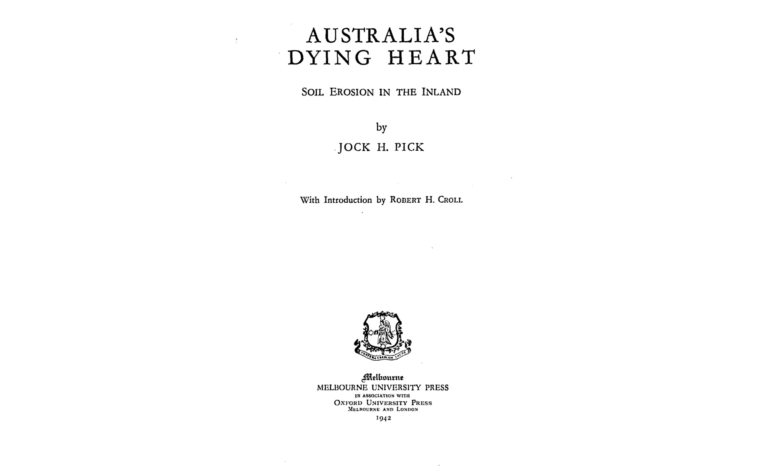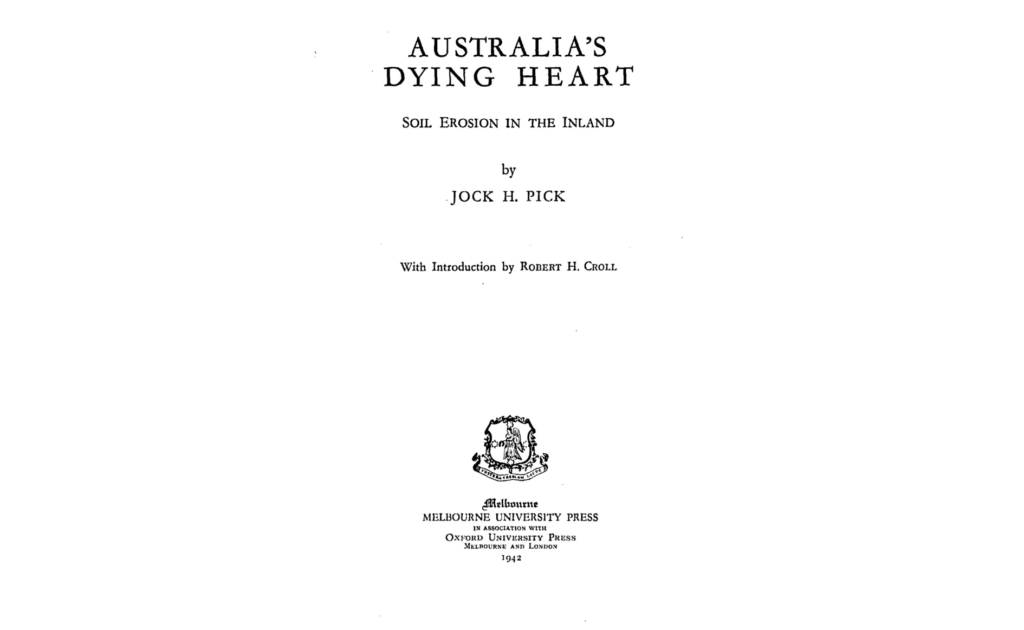Jock H. Pick, Australia’s Dying Heart (1942)
Jock H. Pick was a pioneering pastoralist and a prominent figure in the North-West of South Australia whose hands-on knowledge of the problems of the land led to him becoming something of an environmental crusader.
Pick came from a family with a long involvement in the pastoral industry, and he certainly did not want the land locked off from development and agricultural use in the way that some modern environmentalists might advocate. Nevertheless, Pick stressed that the incorrect and over-utilisation of the land was causing irreversible erosion and environmental damage that must be stopped. This was a crucial issue, as extensive immigration schemes of the early 20th century had concentrated on the idea of ‘closer settlement’ and building an increased population sustained by agriculture – fueling the environmental destruction and jeopardising the development it was intended to encourage.
Written in the midst of the Second World War, Australia’s Dying Heart framed the environmental issue as a significant conflict in its own right. The book opens with an introduction from well-known poet, author and public administrator Robert Croll who made the bold proclamation:
‘War has come to Australia. The danger is real indeed but, I say it deliberately, not more real than the insidious threat by an enemy we have had with us for years. We can, and will, repel the foe now hammering our frontiers — we are eager and willing to enter the lists against him; but we are actually encouraging and assisting this other enemy, civilization’s greatest menace, soil erosion.’
This is the theme that Pick then picks up and runs with, arguing:
‘At the present time, the best of our young men are on the other side of the world, giving their lives to preserve that heritage of freedom and prosperity which we owe to future generations of White Australians. Of what avail is their sacrifice, if an enemy within the gates is to be allowed to rifle the future resources of their country? Soil erosion is that enemy, an enemy more insidious than the traitor within the gates, a destroyer more deadly than all the Hitlers of history. Such men have their brief day of destiny and pass on like a dream of evil. The misery which they inflict is confined to the generation foolish enough, or sinful enough, to permit their elevation to such heights of power.
Soil erosion is an enemy far more ferocious. Its evil influence is everlasting. Once a country has been surrendered to the forces of erosion, it is rarely, indeed, that it can ever be reclaimed. Berbers, Egyptians, Arabs, Persians and Mongols all had their day of glory and departed. Each of these was, in turn, defeated by those same forces of decay which the rifling of its soil resources had released. Let not Australia go the same way. In the struggle which lies ahead with the foulest enemy we Britons have ever had to tackle, every other consideration must be laid aside. If the urge to produce wool and meat for our armies and for exchange to buy munitions becomes acute, no consideration can stand in the way of production. If, at the end of this war, the British Empire is bled white, the enemy must be bled whiter. We must throw everything we have into this fight. If possible, let us keep these other very important matters in mind. When the war is over, and Britain is herself again, in the reconstruction which must follow, we will build a better, greater, safer Australia. That the writer may share in that reconstruction is his only wish.’
Pick was a Labor man who ran as a candidate at the 1944 South Australian election, but his book nevertheless made a strong impression on Robert Menzies, who was inspired to dedicate an entire episode of his radio broadcast series to ‘Saving the Land’ in March 1943. Menzies gave Australia’s Dying Heart a glowing endorsement, saying that ‘if you want to be almost brutally enlightened as to the prodigal way in which we have been attempting to misuse this great land of ours you should read this book’. Menzies went on to denounce the short-term thinking of those who exploited the land without taking care to preserve it, recalling from his own childhood in Jeparit how farmers would clear hundreds of acres of Mallee scrub ‘until it was as bare as a board’ without even a narrow strip left for a windbreak. He identified that:
‘The fundamental problem is that of the soil itself; its conservation; its effective use; a sound scientific understanding of it in all its variations; the adequate conserving of water supplies so that the farmer and his land may not be always at the mercy of the weather and of the drought cycle.’
His solution was to invest in organisations like the Council for Scientific and Industrial Research, and bring to the farmer ‘all the knowledge that agricultural science can give him and all the means of combating the destructive forces of nature which a wise public policy and a willing public expenditure can afford’. This he regarded as a far higher priority in securing the future of Australian agriculture than the organised marketing schemes designed to secure a fair price for produce which tended to be what the Country Party spent much of its time focusing on.
Sign up to our newsletter
Sign up for our monthly newsletter to hear the latest news and receive information about upcoming events.



